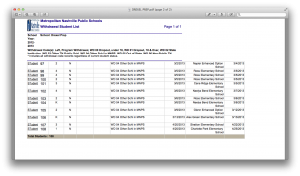Yesterday, Sen. Lamar Alexander and Sen. Rand Paul stopped by Nashville’s KIPP Academy to talk about education issues and to allow Alexander a chance to be photographed next to Tea Party favorite Paul.
The topic of discussion was school choice and the two legislators were joined by Tennessee Education Commissioner Kevin Huffman and House Speaker Beth Harwell.
First, let me say that KIPP Academy and a number of other Charter Schools do very fine work. Charter Schools can offer an alternative that helps kids and the good ones are a welcome addition to the mix of options offered in urban school systems.
That said, the event seemed odd in that it was Paul who was talking about the lessons Kentucky could learn from Tennessee’s education experience. Kentucky has no Charter Schools, no voucher schemes, and not much in terms of what current “reformers” deem necessary to “improve” schools.
Here’s what Kentucky does have:
— Higher scores on the NAEP (National Assessment of Educational Progress) than Tennessee in seven out of eight categories.
— A higher ACT composite average than Tennessee
— A larger percentage of its population with 4-year college degrees than Tennessee
— A lower unemployment rate than Tennessee
In short, Kentucky’s schools are getting results and continue moving in the right direction.
So, it seems Lamar Alexander might want to ask one of the many Democratic governors Kentucky has had over the years about the importance of a long-term commitment to meaningful reform.
Kentucky’s Education Reform Act, passed in 1990, changed the way schools were funded. It set up a new system of testing. It provided early career support for teachers. Funding for all schools was increased. One feature many at yesterday’s event touted about Charter Schools (autonomy, school-based decisions) was written into the Act — Kentucky schools have Site-Based Decision-Making Councils. These bodies (parents, teachers, administrators) make decisions about school governance and budgeting.
Kentucky spends about $1500 more per student than Tennessee and has sustained this investment (for the most part) in good and bad economic times.
Governor Steve Beshear has been committed to high quality early education.
The results are clear: Kentucky’s been committed to meaningful, sustained investment in schools and teachers and it is paying off and continues to pay off.
Tennessee has tried just about everything but sustained investment, with the 2014 legislative session sure to bring up further discussion of vouchers and other schemes – none of which will likely come with more dollars for the classroom or more support for teachers.
And on just about every indicator, Kentucky beats Tennessee when it comes to school-based outcomes.
It’s time Lamar Alexander and Tennessee’s policymakers look north, and learn the lesson that long-term, sustained support for schools is the only way to move students and the state forward.




